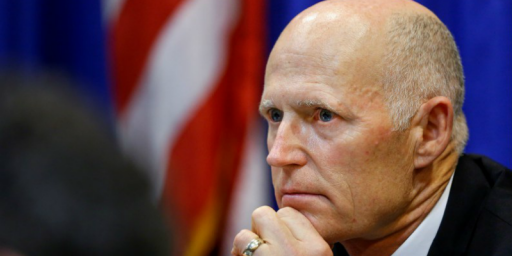Hypocrisy on SCOTUS Confirmations?
An unconvincing attack on the Democratic position.

Florida’s Rick Scott takes to the pages of USA Today with the counterintuitive argument, “Democrats, not Republicans, are hypocrites on filling SCOTUS seat.” He is, alas, not very persuasive.
He gets off to a good start:
In 2016, President Barack Obama appointed Judge Merrick Garland to fill the seat left vacant by the untimely death of Justice Antonin Scalia. Senate Majority Leader Mitch McConnell argued that ”Article II, Section II of the Constitution grants the Senate the right to withhold its consent, as it deems necessary,” and that tradition holds that when a Supreme Court vacancy exists in an election year when there is a president of one party and a Senate controlled by the other, the nomination should wait until after the election.
Eleven Republican Senators, in a letter to Majority Leader McConnell, wrote that you have to go back to 1888 “in order to find an election-year nominee who was nominated and confirmed under divided government, as we have now.”
Sen. John Thune added that ”the Senate Republican majority was elected to be a check and balance to President Obama.” And Sen. John McCain reiterated that position, stating that ”the last time the American people spoke, they elected a Republican majority to the Senate to act as a ‘check and balance’ on President Obama’s liberal agenda — a responsibility I cannot ignore.”
What’s useful here is that it corrects my own understanding of the narrative: While Mitch McConnell initially framed the issue as being about election-year vacancies, period, only later changing it to be about cases of divided government, Scott demonstrates that several key Senate Republicans—including McCain, who was not among the 11 signatories of the letter—were making the more nuanced version of the argument from the outset.
That version, repeated here by Scott, is that, in electing an opposition-party Senate in the midterms, the people are sending a clear signal that they’re less-than-satisfied with the President whereas, by electing a same-party Senate, they’re reaffirming support for the President. While there are major holes in that theory—including the sheer unrepresentativeness of the Senate as an institution—it’s not completely unreasonable. More to the point, to the extent they’ve made it consistently, it relieves Republicans like Lindsey Graham and Chuck Grassley (among the signatories of the above-cited letter) of charges of hypocrisy.
Where Scott’s case falls apart, though, is here:
The Democrats are essentially claiming that there’s no difference between 2016 and 2020. If that’s the case, why are they changing their tune?
In 2016, Sen. Schumer said, “Every day that goes by without a ninth justice is another day the American people’s business is not getting done.”
In 2020, Sen. Schumer said, “This vacancy should not be filled until we have a new president.”
In 2016, Sen. Richard Blumenthal said, “There’s a duty to fill that vacancy, to make the system work.”
In 2020, Sen. Blumenthal said, “This close to the election, there is no way that the United States Senate can or should act before the voters decide.”
In 2016, Sen. Amy Klobuchar said, “Eight is not enough on the United States Supreme Court.”
In 2020, Sen. Klobuchar said that Republicans would face a “moral reckoning” if they attempted to fill the ninth seat on the Supreme Court.
In 2016, Vice President Biden said, ”I made it absolutely clear that I would go forward with a confirmation process as chairman, even a few months before a presidential election. …The American people deserve a fully staffed Supreme Court of nine, not one disabled and divided, one that is able to rule on the great issues of the day.”
In 2020, Biden said, “Let me be clear. The voters should pick a president, and that president should select a successor to Justice Ginsburg.”
But, of course, things are very different now than in 2016.
Yes, as Scott and the Republicans note, party control of the White House and Senate now match.
But we’re also much, much closer to the election. Scalia died in February and Obama named a replacement in March—eight months before the election. By contrast, Ginsburg died in late September and Trump named his replacement almost immediately—just five weeks ahead of the election.
More importantly, though, in terms of the hypocrisy issue: 2016 happened. That is, if one’s position in 2016 was that a President had a right to have his nominee receive a hearing and a vote, the fact that that didn’t happen absolutely has a bearing on how one will treat the shoe being on the other foot. Because Democrats—whether rightly or wrongly—think the Merrick Garland seat was stolen by Republicans using a made-up rule, they are hardly being hypocritical in now wanting that same made-up rule to apply now that there’s a vacancy even closer to the election.






This is a case of something that is legal, but not fair. And I’m talking about Merrick Garland. The current situation just underlines how ridiculous the prior case was.
The only answer to this is political. Vote the bums out.
The thing that impresses me about Sen. McConnell is how good he is at the political calculation. He calculated that this particular maneuver would not hurt his own, or his caucus’ chances in upcoming elections. He appears to have been correct.
This depresses me.
I’m always reminded of the line from The Godfather Part II
‘we’re both part of the same hypocrisy.’
Someone on Twitter made a really good analogy of why the Democrats are not being hypocritical here.
Let’s say we’re playing monopoly. You land on Go and demand $400, claiming it’s a house rule that anyone who lands on Go gets double. I protest, saying I don’t agree with that rule and I’ve never played under it. But, in the end, you’re the banker and give yourself $400. That does not mean that, when I land on Go, you get to say, “Well, you’re not getting $400 because you said you didn’t agree with that rule!” It’s not unreasonable for me to demand that the rules we already played under, even if I objected to them, continue to be the rules we play under.
@Hal_10000:
Quite right.
I’m not sure the position of the 11 letter signers in 2016 was off-the-wall unreasonable. But it’s not the message that McConnell and others carried. I, for one, didn’t get the message and pay more attention than most to these matters. So, like it or not, Senate Republicans come across as hypocritical even though they are merely being cynical.
When the unwritten rules of baseball are more evident than these “traditions” of election year SCOTUS vacancies, I doubt their existence. A bunch of Republican Senators making statements 4 years ago does not make a tradition.
Furthermore, the Senate Republicans did not work in their capacity of offering advise and consent. They flat out refused to hold hearings on the President’s nomination.
This divided government argument continues to look full of holes and hypocrisy.
Republican SCOTUS nominees are required to lie to Congress. That’s Step One. Lie, obfuscate, posture, pretend. Abortion? Why, I’ve never even heard the word!
Then there’s a hearing where Republican Senators lie and lie and lie some more. A chance to stop more people from voting? How dare you accuse me of that?
Finally, there’s a partisan vote.
Question: are we still supposed to pretend the Supreme Court is just about fairly interpreting the Constitution? Or can we drop that bullshit and admit that SCOTUS is a partisan institution?
James, Charlie Sykes uses a term ‘anti-anti-Trumper’.
In one of Steven Taylor’s minority rules posts, he links to Seth Masket:
Gotchas on hypocrisy are just noise. This minority rule construct, including as James states “the sheer unrepresentativeness of the Senate as an institution” is the only story that matters.
@Michael Reynolds: SCOTUS is a partisan institution AND seated by Minority Rules.
I’m going to repeat a point I made in a thread the other day.
Rules and standards should never be based on “divided government.” From the perspective of the Constitution, a Senator is a Senator, their status in relation to other members of the chamber was not a consideration in laying out their duties.
Also, the Senate is elected in thirds. Beyond the already problematic unrepresentativeness of the institution that gets discussed, there is one other issue. The fact is, the possibility of flipping the chamber is entirely dependent on which class is up for re-election and The current composition. Bottom line: the Senate is not a representation of the will of the people…ever.
James, you’re also ignoring a gaping hole in Scott’s argument. Yes, the Senate can withhold consent. But that isn’t what happened, they also withheld the advice part of it via refusing to hold formal hearings.
Looking this seems odd. McConnell chose not to hold hearings. I suspect that McConnell knew that if Garland got to the floor, either the nomination would get through or the ensuing fight would make Republicans look bad.
@James:
The problem is one of small n’s. There are relatively few election-year vacancies, period. Only a handful have occurred with divided government. But, given the escalation along partisan lines, it’s a defensible position–it’s just not one they sold in that manner in 2016.
@Michael Reynolds:
We’ve tacitly acknowledged the latter for a generation now. Indeed, both parties fundraise off the issue. Still, the judiciary as a viable branch of government depends on pretending on the former. It’s getting harder.
Umm, not really…this is all on the Republicans…
James, if you write a post every time Rick Scott proves he’s a lying sack of spit, it will become an all consuming hobby.
The precedent is that the president nominate a moderate acceptable to the opposite party. IIRC Grassley initially told Obama Garland was acceptable. We may have become so partisan that that is no longer possible, but that’s a separate discussion.
@James Joyner: “There are relatively few election-year vacancies….” And we should all be grateful. There was a vacancy in the Chief Justice position in ’68 and Mr Johnson attempted what I bet he thought was the least controversial thing he could do: He elevated a sitting Justice, Abe Fortas. Who had been associated with some financial malarky and drew the opposition of Sen Strom Thurman who threatened a filibuster and got the nomination withdrawn.
That’s why the ‘norm’ violated here is named for one of the most arch-conservative Senators of my lifetime: the ‘Thurman Rule’.
@James Joyner: You’re right, we’re talking incredibly small n’s. And if there’s one thing every kind of statistics says about small n’s, it’s that calculations based on them are inherently unstable. To try to base the idea of tradition on such is silly.
@James Joyner: Also, I have to strenuously disagree that it was a defensible position, at least as it was acted upon. If they wanted to do their job of providing advice and consent on Presidential nominations, they would have held hearings, discussed the merits & demerits, and defended their decision to the country. Instead what they did was try to hide naked power grabs behind tiny fig leaf arguments.
@gVOR08:
Fair enough. I saw the headline on YahooNews so was intrigued. I would have dismissed the column outright other than his starting off correcting my own misimpression of events.
That’s how I understood the norm as well, although there’s really not much evidence for it. It’s been a long time since a President intentionally nominated a moderate to SCOTUS—Garland was actually exceptional in that regard.
@JohnMcC: In fairness, said scandal ultimately caused Fortas to resign from the Court altogether.
@James:
Yes
@James:
I think the action was indefensible only because of the timing. Had Scalia died in late September, as Ginsburg has, I wouldn’t have objected to the Republicans saying “Let the election decide.” But holding the seat open for almost a whole year was beyond the pale.
Whiners. They complain when we change the rules, and then when we go back to the original rules, as though our benefit and privilege do not matter.
@James Joyner: “Still, the judiciary as a viable branch of government depends on pretending on the former.”
Pardon me if I said something like this before, but if the viability of a branch of government depends on everyone pretending it’s something it’s not, then it’s not really viable. We have to live in reality or we end up like the Cherbobyl-era Soviet Union.
@James Joyner:
I’m old enough to remember Ted Cruz saying that if Hillary won they might just hold up nominees for her whole presidency.
@wr: You may well be right. Jamelle Bouie has an interesting column out arguing—from the Left—that we should just do away with the deference to the courts as the sole arbiter of what the Constitution says. But, damned if I know what the alternative is. Absent a constitutional monarch to issue pronouncements, it just comes down to what the elected branches can get away with sans referees.